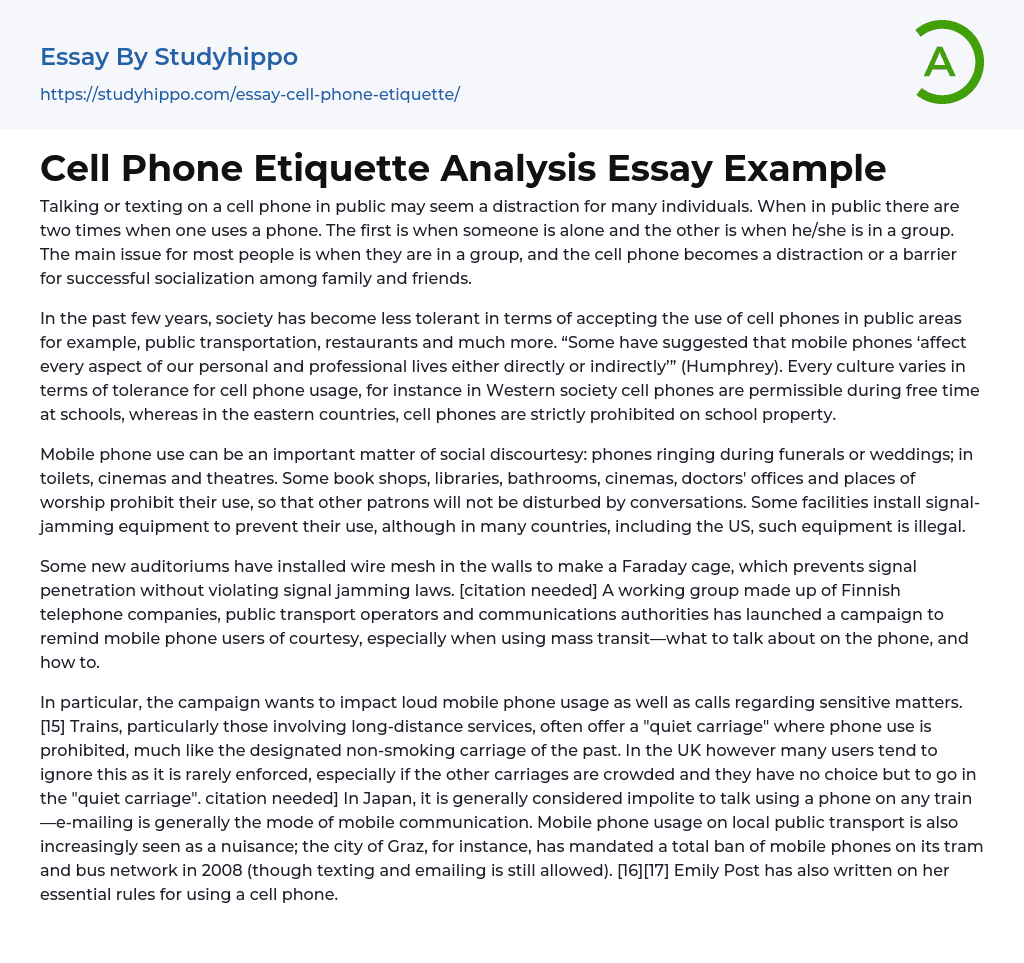Talking or texting on a cell phone in public may seem a distraction for many individuals. When in public there are two times when one uses a phone. The first is when someone is alone and the other is when he/she is in a group. The main issue for most people is when they are in a group, and the cell phone becomes a distraction or a barrier for successful socialization among family and friends.
In the past few years, society has become less tolerant in terms of accepting the use of cell phones in public areas for example, public transportation, restaurants and much more. “Some have suggested that mobile phones ‘affect every aspect of our personal and professional lives either directly or indirectly’” (Humphrey). Every culture varies in terms of tolerance for cell phone usage, for instance in Western society cell phones are permissible d
...uring free time at schools, whereas in the eastern countries, cell phones are strictly prohibited on school property.
Mobile phone use can be an important matter of social discourtesy: phones ringing during funerals or weddings; in toilets, cinemas and theatres. Some book shops, libraries, bathrooms, cinemas, doctors' offices and places of worship prohibit their use, so that other patrons will not be disturbed by conversations. Some facilities install signal-jamming equipment to prevent their use, although in many countries, including the US, such equipment is illegal.
Some new auditoriums have installed wire mesh in the walls to make a Faraday cage, which prevents signal penetration without violating signal jamming laws. [citation needed] A working group made up of Finnish telephone companies, public transport operators and communications
authorities has launched a campaign to remind mobile phone users of courtesy, especially when using mass transit—what to talk about on the phone, and how to.
In particular, the campaign wants to impact loud mobile phone usage as well as calls regarding sensitive matters. [15] Trains, particularly those involving long-distance services, often offer a "quiet carriage" where phone use is prohibited, much like the designated non-smoking carriage of the past. In the UK however many users tend to ignore this as it is rarely enforced, especially if the other carriages are crowded and they have no choice but to go in the "quiet carriage". citation needed] In Japan, it is generally considered impolite to talk using a phone on any train—e-mailing is generally the mode of mobile communication. Mobile phone usage on local public transport is also increasingly seen as a nuisance; the city of Graz, for instance, has mandated a total ban of mobile phones on its tram and bus network in 2008 (though texting and emailing is still allowed). [16][17] Emily Post has also written on her essential rules for using a cell phone.
- Email essays
- Etiquette essays
- Hypertext Transfer Protocol essays
- Mainstream essays
- Marshall Mcluhan essays
- Virtual Learning Environment essays
- Vodafone essays
- Web Search essays
- Aviation essays
- Emergency Management essays
- Health Insurance essays
- Insurance essays
- Life Insurance essays
- Public Transport essays
- Transportation essays
- Network Topology essays
- Telecommunication essays
- Telecommunications essays
- Artificial Intelligence essays
- Bitcoin essays
- Encryption essays
- Robotics essays
- Text Messaging essays




